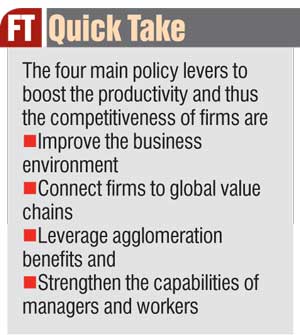Tuesday Feb 24, 2026
Tuesday Feb 24, 2026
Monday, 7 November 2016 00:37 - - {{hitsCtrl.values.hits}}
With a growing urban workforce and focused implementation on a wide range of recent reforms that are good for growth, Sri Lanka can seize the opportunity to become a greater manufacturing and export powerhouse, according to a new World Bank Group report to be released today.
To increase its competitiveness, Sri Lanka can better take advantage of a confluence of positive factors such as its geographic location, trade linkages, comparatively high education levels and growing cities. Additionally, it should work diligently to increase regional and global integration, take advantage of agglomeration economies, strengthen firm capabilities and improve the business environment. Its annual export growth from 2000-2013 of 5% is lower than that of many of its neighbors. The country’s  competitiveness potential is illustrated by the success of its leading firms.
competitiveness potential is illustrated by the success of its leading firms.
“Sri Lanka’s leading firms have risen to standards of global excellence, demonstrating that world-class levels of operational performance, efficiency and innovation can be achieved with the right management, technology and worker training,” said World Bank Country Director for Sri Lanka and the Maldives, Idah Pswarayi-Riddihough.
“These flashes of brilliance across a growing number of areas, locations and leading firms can provide inspiration for reforms and serve as examples for the country and region’s rising firms.”
Overall, however, Sri Lanka can perform better in terms of both the quantity and quality of its exports, fundamentally because many of its firms are not nearly as productive when compared to their potential.
According to the new report, entitled ‘South Asia’s Turn: Policies to Boost Competitiveness and Create the Next Export Powerhouse’, the four main policy levers to boost the productivity and thus the competitiveness of firms are to improve the business environment, connect firms to global value chains, leverage agglomeration benefits and strengthen the capabilities of managers and workers.
World Bank said the Sri Lankan Government has identified the need to facilitate the transformation of the economy from one that has been largely inward-oriented and led by the public sector to one that is export-oriented and led by private entrepreneurship.
This recognises the fact that the sources of growth over the past decade (mainly construction and non-export sectors) are not enough to create the sustainable and inclusive growth that the country needs going forward. Unleashing the potential of the Sri Lankan private sector to compete and trade is essential to facilitating the creation of more and better jobs that are in line with the aspirations of the Sri Lankan population.
“Sri Lanka has tremendous potential to increase incomes and gain market share in exports through policies that enhance productivity and investment,” said Vincent Palmade, one of the report’s co-authors.
“Policymakers can encourage the flow of resources to more productive firms by actively managing urbanisation and reducing congestion constraints through, for example, fostering a productive collection of firms next to pools of qualified workers with easy access to domestic and export markets.”
To better connect and expose Sri Lankan firms to international good practices, the Government could consider deepening relevant reforms to improve the capabilities of firms to participate in global value chains, which will require making it much easier for exporters to import what they need, gradually reducing tariffs while improving trade logistics. Policymakers can encourage the flow of resources to more productive firms by actively managing urbanisation and reducing congestion constraints.
With support from the Government, firms can improve their productivity and competitiveness by investing more in training their workers and managers, innovating to introduce new products and processes, as well as making greater use of the potential of the Internet to buy, sell, market and manage their inventory.
Together, these proposed reforms and investments will help Sri Lanka take a turn towards realising its great competitiveness potential.